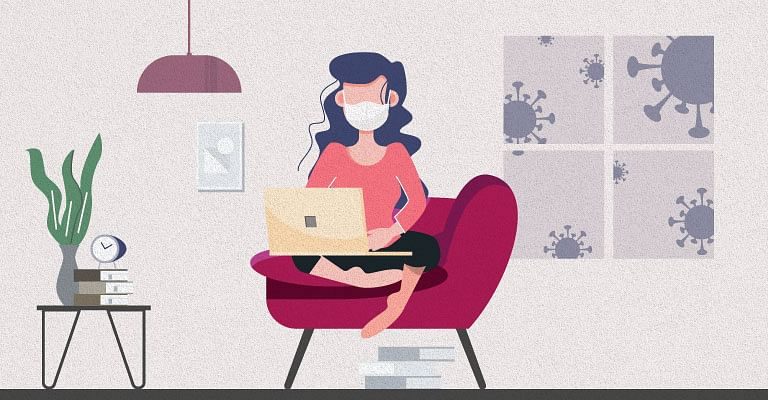It has been more than a year, living with the Pandemic. We have learnt to deal with the situation and have come a long way – from being extremely fearful to being vigilant; from venturing outdoors to confining indoors; from offline to online; from operating at office to working from home and from in-person to virtual.
Even today, it seems like we are living in a different world altogether and the transition was not easy. If the initial pandemic time was scary, it is a notch above for everyone now. The concerns seem to be multiplying, with the virus infecting a few, but affecting everyone.
Dealing with challenges of this magnitude was difficult for every family, organization, and society. Furthermore, it continues to be extremely restrictive for some sections of population, including women. According to the Women in the Workplace Study from Leanin.Org and McKinsey last year, “despite companies’ efforts to support employees during the crisis, women are feeling more exhausted, burned out, and under pressure than men”. Understandably so, as the reasons continue to be many more!
THE EFFECTS OF PANDEMIC ON WOMEN
The spread of pandemic was rather impartial across all countries in the world, but the effects have not been that neutral. Women were more prone to its effect as Covid-19 and gender neutrality had been at loggerheads. “The pandemic is deepening pre-existing inequalities, exposing vulnerabilities in social, political and economic systems which are in turn amplifying the impacts of the pandemic”, stated a UN policy brief published in April 2020.
If maintaining balance of work on all fronts, manage domestic responsibilities, care giving (self, children, and elders) as well as taking care of the mental and emotional wellbeing was a daunting task earlier, it only turned out to be overwhelming and exhausting during pandemic. Apart from the pre-existing barriers, some new ones have emerged post Covid.
Increased Responsibilities:
Whether women are engaged in formal or informal employment, fulltime or part-time, white collar or blue, any grade or function, ratcheting up of responsibilities further put a strain on physical and mental health. Despite all the talk of modernization, culture change, use of technology, flexibility at workplace, there are certain things which even today are perceived as ‘women’s job’ and the pandemic only highlighted the fact that we are too far away from an ideal society of ‘sharing the load’. Distribution of domestic work is disproportionate and most of the time, women end up getting a lion’s share!
Women were more prone to its effect as Covid-19 and gender neutrality had been at loggerheads. “The pandemic is deepening pre-existing inequalities, exposing vulnerabilities in social, political and economic systems which are in turn amplifying the impacts of the pandemic”, stated a UN policy brief published in April 2020.
New tasks in the already dwindling work-life-balance
If taking care of children’s studies and extra-curricular activities was not enough, the online studies during pandemic brought some new challenges like – familiarizing children with online classes, monitoring their screen time, enabling them to take up online studies, exams, home-tasks, uploading the exam papers that required parent’s authentication etc. A few other tasks included, familiarizing elderly with online doctor consultations, online ordering of groceries and medicines, pressure to prepare additional cuisine, both to fulfill the demand of the family members and to meet the social media demand of conjuring up new dishes every day.
Strain due to closure of support systems
Before pandemic, women had made lot of efforts to set right/manage the umpteen personal and professional responsibilities, which were supported by some external help. What made this efficiently crafted system to collapse during pandemic was closing of the support systems (crèches, Care centre, domestic help, easy-readymade food and grocery stores, laundry, tuition centers, sports coaching centers etc.). In the absence of these, carrying on the show was the prime responsibility of “lady of the house”.
Decrease in job opportunities:
Most of the industries affected during pandemic were food and beverages, retail, entertainment, handlooms, construction, and many other small-scale industries, where women employees are more. Even the domestic workers, 85-90% of whom are women, had no jobs during pandemic as everyone was paranoid allowing anyone at home or office. With loss of job opportunities, economic empowerment was hard hit and the loss of income lead to economical and emotional burden for women.
Increase in domestic violence
Studies have shown that there has been a global surge in cases of domestic violence against women, during pandemic. Living in proximity as well as with loss of steady source of income due to lockdown, it put families in stressful situation. There was no way to reach out to other family members, friends, and respective social networks, which turned out to be frustrating. All this culminated to situations where women ended up taking more abuse, violence, and harassment than before.
The dichotomy of flexibility
One would argue that most companies shifted to WFH offering more flexibility and no commute time. So, things should have been easier to manage. The reality is far from this. The dichotomy of the situation is, during WFH it is difficult to concentrate on office work alone as there are multiple roles to fulfill at home. This dilemma did not exist before pandemic. Alternatively, shifting to full time work from office becomes stressful as most of the support system is still not available.
Living in proximity as well as with loss of steady source of income due to lockdown, it put families in stressful situation. There was no way to reach out to other family members, friends, and respective social networks, which turned out to be frustrating.
A NEW HORIZON IN THE MAKING
One of the positive aspects of pandemic is the major shift in our mindset, perspective, and ways of working. It also prompted the importance of economic empowerment of women because when women’s representation in the formal workforce increases, the impact will be manifold, not only in their families but also in the society. A few changes happened for good were:
- Organizations have started exploring ways and means to get women back in jobs, whose careers have been stalled due to pandemic.
- WFH has been adopted by most of the organizations and with hybrid workplace becoming a norm than exception, women who had taken a break, are able to opt for resuming work, due to flexibility in work-timings, part time jobs, working from a remote location etc.
- Policies are getting more inclusive, flexible, and supporting to create the right balance, personally and professionally.
- It was realized that for many tasks, travel and in-person meetings are not necessary. Same outcomes can be achieved through virtual meetings. While this turned out to be a boon for everyone, it was particularly helpful for women, as they tend to be paranoid while traveling due to their higher share of domestic responsibilities.
- One of the good signs is that society, slowly but steadily, is able to gauge the role of women and the support system it needs, both within the family and outside.
- During pandemic, with everyone at home, there was good beginning in sharing the domestic responsibilities. It started with casual cooking-for-fun, but in a way lead to realizing the importance of sharing the workload, in whichever way possible.
When all these are collectively viewed, we can expect tangible benefits and a future where women’s participation is more in the formal workforce, leading to economic independence of women, enhancing the financial position of the family and a more progressive society.























